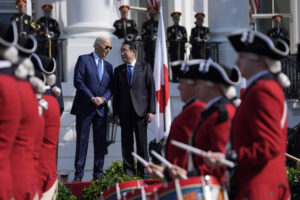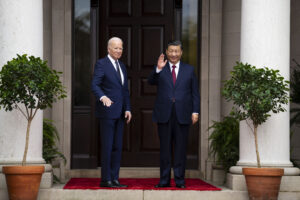Playing Chicken in the East China Sea
Just days after the U.S, Japan and South Korea flew through China’s freshly declared air defense zone over the contested Senkaku Islands and an untapped natural gas field, China deployed fighter jets and an early warning aircraft to the region.
How do military incidents explode into a crisis?
Through stupidity. And we’re watching one such scenario unfold in the East China Sea.
Just days after the U.S, Japan and South Korea flew through China’s freshly declared air defense zone over the contested Senkaku Islands and an untapped natural gas field, China deployed fighter jets and an early warning aircraft to the region as “a defensive measure and in line with international common practices,” according to the BBC.
The move has raised concerns that jockeying for position could lead to a military showdown even as China seeks to remove some of the tension it created. Per the Guardian:
Taylor Fravel, an expert on regional security at the Massachusetts Institute of Technology, said establishment of the zone increased the potential for an incident in the air that could spark a larger crisis. But he said tensions might ease if China continued to clarify the nature of the zone and how it intended to deal with unidentified aircraft, especially those flying through the zone but not heading toward China.
“China has always chafed at Japan’s ADIZ [air defense identification zone], which at some points is less than 150km from China and has been used by Japan to report intrusions into Japan’s airspace. China probably wants to level the playing field with Japan and increase the pressure on Tokyo regarding the disputed islands,” he said.
Japan does not acknowledge that the ownership of the islands is disputed. The US does not take a view on sovereignty but recognises Japan’s administrative control and has said the joint security pact covers the islands.
Many analysts think China is laying down a long-term marker, but did not anticipate the forceful response it has received from the US as well as Japan.
“I think the logic is that incrementally it will make other countries accustomed to China exerting an enhanced degree of authority in that space,” said Rory Medcalf of Australia’s Lowy Institute.
But there is enough concern that Vice President Joe Biden — who made foreign policy an area of expertise during his years in the U.S. Senate — plans to talk to Chinese and Japanese leaders about the issue during a weeklong Asia trip that starts Sunday. According to The Washington Post:
Officials said Biden will have high-level, wide-ranging talks with Chinese President Xi Jinping during his stop in Beijing, but they acknowledged that the vice president is likely to raise objections to China’s claim last weekend of control of an “air defense identification zone” over disputed waters between itself and U.S.-ally Japan.
Biden will “have the opportunity to make clear to the Chinese leadership that we have concerns and questions,” said a senior administration official during a conference call with reporters. The official spoke on condition of anonymity to discuss sensitive matters. “But I think that underlying point here is that the strain caused by the series of actions by China in relations with its Asian neighbors is not a good thing. It’s not good for the United States; it’s not a good thing for anyone. I think the visit allows the vice president to discuss the issue of how China operates in international space and deals areas of disagreement with neighbors.”
—Posted by Scott Martelle
.
Your support matters…Independent journalism is under threat and overshadowed by heavily funded mainstream media.
You can help level the playing field. Become a member.
Your tax-deductible contribution keeps us digging beneath the headlines to give you thought-provoking, investigative reporting and analysis that unearths what's really happening- without compromise.
Give today to support our courageous, independent journalists.






You need to be a supporter to comment.
There are currently no responses to this article.
Be the first to respond.